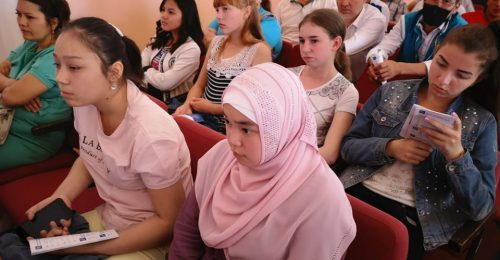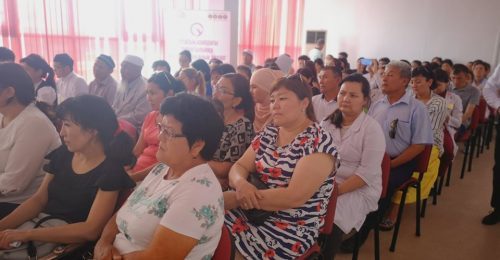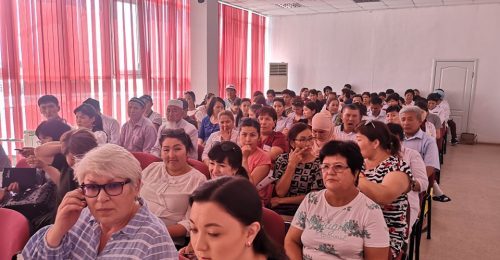The events were attended by 314 people – social workers, local government representatives, community leaders, theologians, students and religious figures.
Five dialogue meetings and three intellectual games were held in the regional centers of Kazakhstan – Asa, Zhanatas, Karatau, Merke and Kulan. The events were organized by the IWPR Representative Office in Central Asia in cooperation with organizations of legal entities “Association of Religious Studies Centers” and with support of the Office for Religious Affairs of the Zhambyl region’s Akimat.
Follow us on Twitter!
The speakers were – the expert on deradicalization, director of the ALE “Association of Religious Studies Research Centers”, a member of the AGMF “Zhas Otan” Council Aziza Zhumagaliva, and Rezeda Baimuhamedova, a clinical psychologist, director of the Center for Psychology and Personality Development “Ruh”.
Despite the great work carried out by the outreach groups, there is a great need for preventive work in order to increase the level of knowledge on religious issues, the causes and factors of radicalization and improve interaction between actors to promote tolerance values in Kazakhstan.

These events had a unique approach for this region, differed in intensity and large amount of information. In order to achieve the goals, informative presentations, brochures, interactive games, as well as test tasks were developed.
The first part of the events began with interactive meetings with the local community. The meetings began with the presentation of Aziza Zhumagaliyeva, an expert on deradicalization, which described in detail the religious diversity of the region, the religious policy of Kazakhstan and the importance of religious tolerance in preventing violent extremism. She stressed that in Kazakhstan all religions are equal and there are no traditional religions, and also that the state and religion are separate from each other.
According to the law, information about religion should be obtained only in special religious institutions, of which are counted 3,518 in the country.
“Having experience in this field, I can say for sure that it is possible to be vaccinated against extremism. Working with people can significantly reduce the risks and protect our society from destructive ideology. Work with youth is especially important, as it is the most active and promising part of our society, and in turn is a “tidbit” for extremists, ”Zhumagaliyeva shared her opinion.
Further, it was told about the importance of using the correct terminology and the danger of using hate speech and clichés. For example, the word “sect” should not be used in relation to religious organizations registered in Kazakhstan. The lecture continued with a review of banned extremist, terrorist organizations, and criminal liability for the storage, distribution of the symbols and literature of these organizations.

At the end of this block, deradicalization expert told about the special operation “Zhusan” for the repatriation of Kazakhstan citizens from refugee camps in Syria. Zhumagaliyeva explained that the return of Kazakhstanis will contribute to deradicalization and intensification of joint efforts for the rehabilitation of women and children. At the same time, stigmatization and discrimination will only contribute to the radicalization of the citizens.
The second part of the dialogue meetings was devoted to the manipulative methods of violent ideologies and how human rights violations affect radicalization. Clinical psychologist, rehabilitation expert Reseda Baymukhametova told the participants how to recruit people at the level of consciousness. According to her, people fall under the influence of extremist organizations more in search of support and justice, rather than obtaining information about religion. The expert also explained how to properly deal with radicalization and told about the methods of explanatory work among young people.

“We need to understand that a person who is subject to discrimination is very vulnerable to violent extremist ideologies, he can easily succumb to radicalization. This is especially true of young people. We have to take joint efforts, and increase interaction to prevent problems in the early stages. Timely prevention is the guarantor of our bright future” says Baimuhametova.
The session continued with a practical exercise, where participants of the meeting discussed in groups which actors play a role in preventing violent extremism. They shared their vision of the religious situation in the Zhambyl region, and also suggested possible steps towards improving interaction to prevent violent extremism.

“These events are of great importance for the local population. First, the speakers shared very useful information, ranging from the religious sphere in Kazakhstan to manipulations methods of destructive-radical movements. Secondly, this is a great opportunity for an open dialogue, where representatives of the local community can discuss and ask pressing questions in the field of religion. This format of events will have a positive effect on society” said Bakhyt Zhumasetov, a representative of the Religious Affairs Department of Merken and Ryskulov districts of Kazakhstan.
The second part of the events was timed to intellectual games for young people, where 105 representatives of youth organizations and institutions were involved. The speakers were Aziza Zhumagaliyeva and Resed Baimukhametov.

The first block of intellectual games was devoted to lectures on the religious diversity of Kazakhstan and the importance of promoting tolerance. Experts offered participants to take part in interactive games, which were focused on radicalization causes and the need for joint efforts in solving problems.
The second block of intellectual games included test assignments. Participants were divided into groups and competed in the knowledge of extremism concepts, legislative framework and the foundations of human rights. Based on the results of participants, experts had discussed with them the correct answers. In the process, participants voiced their vision of solving the problem of violent extremism, and asked questions.

“Today I have learned a lot at this event. Particularly, I was impressed by the fact that there were many young people from among those who left for Syria. We, as an active youth, must fight this. And taking this opportunity, I would like to urge young people not to leave and not to succumb to violent extremism ideologies”, – Maulenova Arai, participant of the intellectual games.
Informational brochures were distributed to the participants of the events, which contain pieces of legislation, reports on the inter-confessional council, religious diversity in the Republic of Kazakhstan, as well as methods for promoting dialogue.
The events aroused great interest among the local media, which covered the events in the news, and also interviewed experts and organizers.

IWPR plans to hold similar meetings in other areas of Kazakhstan.




